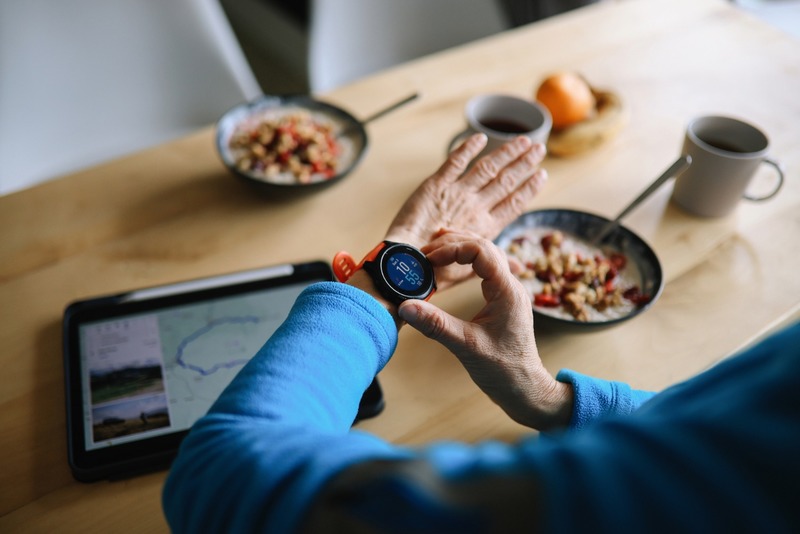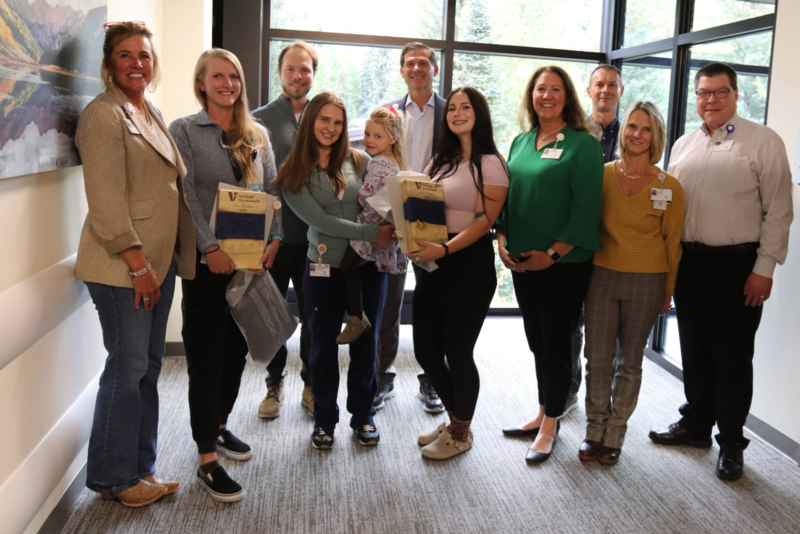News
You Age If You Slow Down
At age 72 John Dunn said the Vail Valley has to be one of thebest places in the world to stay healthy and active. He and hiswife Karen have been living in the valley for more than 30years.
John started running in his 30s and has continued ever since butbegan incorporating strength training into his fitness regimenabout five years ago.
"I agree with whoever said you don't need to slow down as youage" Dunn said. "You age if you slow down."
John is registered for the Philadelphia Marathon in November andsaid he plans to do some hiking this summer with the hope ofclimbing a 14er. He skis in the winter and continues his walkingrunning and strength regimens year-round.
Age however isn't as arbitrary to some. John and his wifeshare a life together but they live it through very differentbodies. Later years can lead to developing conditions even after apast of health and wellness.
Every body is different
While John has been increasing his fitness dynamic in the pastdecade Karen who is 73 has been struggling with Inclusion BodyMyositis a rare neurological disease since she was in her60s.
She said the disease progresses gradually and is not painful butthat she will continue to lose muscle control as she ages.
Karen works with certified personal trainer Stacey Vachon atDogma Athletica in Edwards.
"I went to Stacey because it was obvious that regardless of whatmy doctor said I was eventually going to be an indolent" shesaid.
Vachon said she taught Karen skills and strength to helpincrease her confidence. They worked together on endurance andbalance so that Karen could go on walks by herself park fartheraway in parking lots open doors with one hand and climb anddescend stairs on her own.
"Karen wanted to be self-sufficient as much as possible" Vachonsaid. "She increased her balance to the point that if she stumblesshe now just makes it part of a dance!"
Karen said she has no other health issues but does work withVachon to keep her weight in check to maintain general health andavoid diabetes. She works with Vachon two to three times per weekand does nightly exercises on her own.
"Stacey encourages me to walk" Karen said. "I do a littleweight lifting at home in conjunction to what she's teachingme."
Karen said having a trainer really helps make fitness morespecialized to personal needs.
"It's very very important to have a trainer who is focused onyou especially as you get older" Karen said. "It doesn't have tobe every week it can be once a month or once every twomonths."
As her disease began to progress Karen became more dependent onher husband and others. That's when she went to Vachon to beproactive about doing what she could to maintain her health.
Keep up with ?tness
"As humans get older our strength balance neural function andbone density can decline even faster than our aerobic fitness if wedon't train these aspects" Vachon said. "We also become moreinclined to follow the same motor patterns which can lead to someimbalance."
Vachon said working with a specialist can help peopleparticipate in the activities they love to their fullest potentialand with a lower probability of injury.
"We are there to support you and everyone is sharing one basicgoal and that is simply to be a better you" Vachon said. "Onceyou understand this the fear factor of being in a gym disappearsknowing you are now in a place where everyone wants you to besuccessful."
Vachon recommends doing something physical every day to stayactive and to stay young in your head and in your heart. She alsorecommends keeping a journal to stay on track and create positivepatterns with wellness fitness and nutrition.
Dr. Tracee Metcalfe adult hospitalist at the Vail ValleyMedical Center said consistent exercise regimens will help men andwomen in their 70s maintain their health.
As people age body composition increasingly changes from muscleto fat Metcalfe said. Exercise can help people maintain muscle andstamina and Metcalfe recommends 30 to 60 minutes of exercise fivetimes per week.
"The exercise does not have to be vigorous it can be walkingbiking or swimming." Metcalfe said. "Try to do some weight-bearingexercises such as walking or lifting weights three times a weekfor 30 minutes."
Metcalfe said to eat a healthy diet and to eliminate smoking.She said to limit alcohol to one drink per day for women and twodrinks per day for men.
She also recommends reducing your risk of falling and injury byremoving throw rugs cords and clutter from your home.
Emotional well-being
Dr. Drew Werner a family practitioner in Eagle said thatalthough balance vision and strength are factors that people intheir 70s should pay attention to mental wellness is alsocritical.
"In this decade people experience the loss of friends andfamily and they begin to see their peer group decrease" Wernersaid. "This can easily lead to social isolation."
He also said that the loss of vision strength reaction time ormemory loss may make it harder for people in this age group tocontinue to live independently. It's important to recognizeproblems even small ones and talk to your doctor and decide howbest to prepare for life changes he said.
"Don't fear life's struggles or they will overcome you" Wernersaid. "Ask for help and people will often be ready to give."
Sharing love and life
"Staying active and on top of health maintenance will make it easyto stay healthy in the future" Metcalfe said. "It's important forpeople who are aging to stay mentally active and to get moreinvolved in their community."
Werner recommends remaining socially active by maintaining awillingness to step out of a peer group and find friends andactivities generally dominated by younger people.
Karen said she and John enjoy entertaining friends and she saidshe has embraced her interest in needlepoint and has even gone toneedlepoint retreats.
"Although I have problems physically mentally I am a student atheart and I enjoy life" Karen said. "I think it's important tokeep a positive outlook and I think friendship and laughing arealways important."
Physical wellness recommendations by Dr. Tracee Metcalfefor men and women in their 70s:
Yearly physical exam skin exam blood pressure weight andbody-mass index regular dentist visits and cleanings.
American Association of Ophthalmology recommends yearly eye examto look for glaucoma macular degeneration and cataracts.
Cholesterol and diabetes check every three years.
Colonoscopy if not already performed and then follow-up based onfamily history and initial result.
Hearing exams every three years.
Screen for osteoporosis if this has not already been done.
Consider checking thyroid B12 iron vitamin D.
Make sure vaccinations are up to date including a yearly flushingles pneumonia and tetanus every 10 years.
Polypharmacy starts to become a real problem at this age so askyour doctor to review all drugs you are on at least once a year tomake sure there are no drug-drug interactions or medications thatcan increase your risk of falls. Make sure your doctor knows allthe supplements you are taking.
Discuss feelings of depression with your doctor.
Women specific:
Hormone-replacement therapy: evaluate whether it is still neededand if not try to discontinue it.
Pelvic exams: Metcalfe said the American College ofGynecologists recommends yearly pelvic exams to look for vaginalcancer and vaginal dryness and to help with incontinence. Womenshould have yearly pelvic exams and mammograms Metcalfe said butpap smears can be discontinued if you have had three normal examsand if you have no risk factors for cervical cancer.
Men specific:
Consider having testosterone levels checked.
Address any urinary issues you are having with yourdoctor.
Discuss with your doctor whether or not a prostate screening isright for you.
Metcalfe said the American Urological Society and the AmericanCancer Society discourage a prostate screening if life expectancyis less than 10 years. However she said that there are plenty ofpeople in their 70s for which a prostate cancer screening isperfectly appropriate.
More News
-
New!
More

First Chair to Last Call: What Does Alcohol Really Mean For Your Health?
In nearly every Colorado ski town, some iteration of the neon sign blares its play-hard-party-harder anthem. It’s a not-so-subtle nod to mountain party culture, a lifestyle that normalizes combining sports and outdoor adventures with heavy drinking and partying. In Eagle County, après culture, high-altitude living and outdoor performance have coexisted for as long as locals have been sliding on snow. But how much is too much at altitude? And what role do social support systems play in helping residents find balance?
-
New!
More

Counting More Than Steps: How Wearables Can Help (or Hinder) Your Health
From step counts to sleep stages, heart rate variability to blood sugar spikes, wearable devices are giving us a front-row seat to what’s happening inside our bodies. Strapped to wrists, slipped onto fingers or wrapped around our biceps, wearables like the Oura Ring or Whoop strap promise insight and advice in the quest for better health.
-
More

Cass Barham and Sarah Crabtree Honored As Recipients of Vail Health Elevate Award
Cass Barham and Sarah Crabtree, both lab techs at Vail Health Hospital, have been named recipients of the Vail Health Elevate Award. Vail Health created the Elevate Award in June 2022 to give patients and their families an opportunity to nominate and thank employees who have touched their lives in some way.
